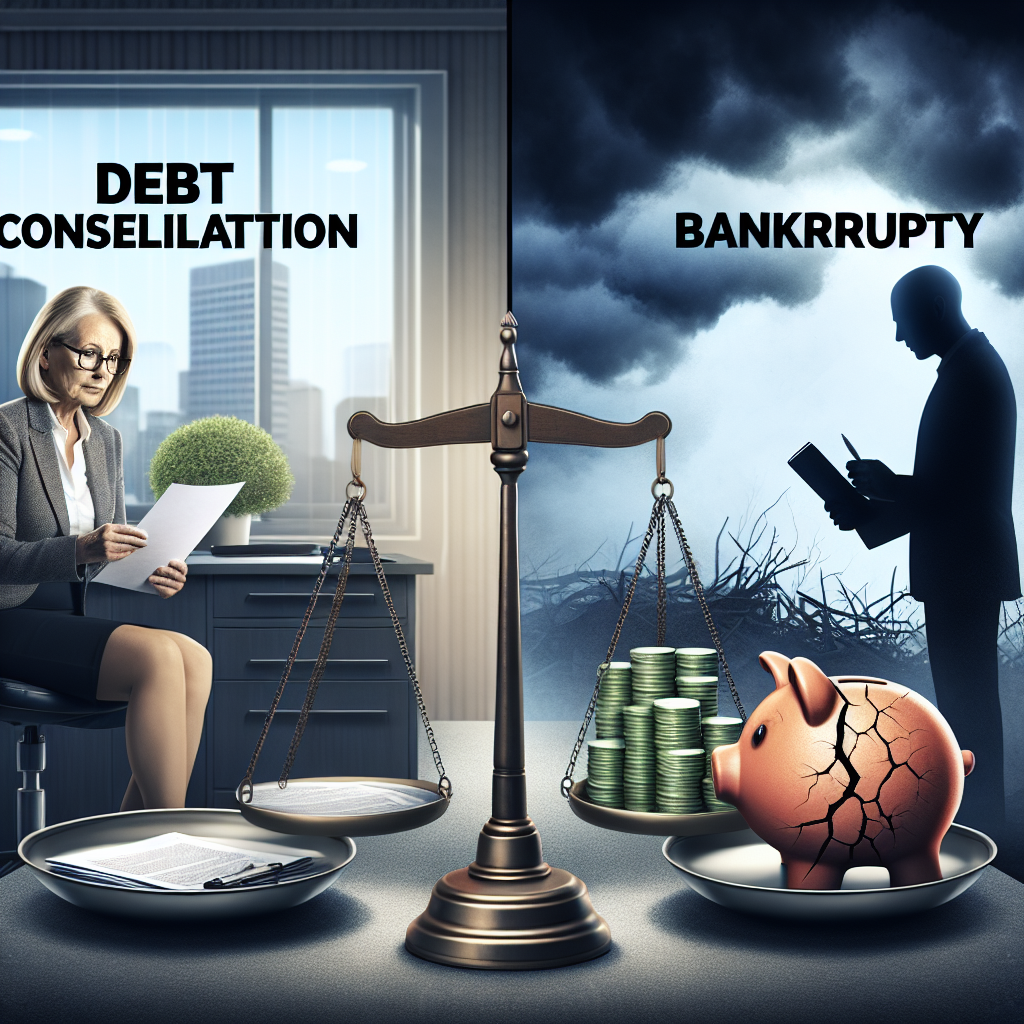Debt can be overwhelming, and when individuals find themselves in a precarious financial situation, two of the most common solutions that arise are debt consolidation and bankruptcy. Understanding the differences, benefits, and drawbacks of each can help individuals make informed decisions. In this article, we will conduct a thorough comparative analysis of debt consolidation and bankruptcy.
What is Debt Consolidation?
Debt consolidation involves merging multiple debts into a single loan, typically with a lower interest rate. This process simplifies payments and can ease monthly financial burdens. Debt consolidation is often seen as a personal finance strategy aimed at reducing overall debt and improving credit scores.
Benefits of Debt Consolidation
- Simplified Payments: Instead of managing multiple payments to different creditors, individuals make a single monthly payment, making budgeting easier.
- Lower Interest Rates: Many people can secure a lower interest rate than what they were previously paying, reducing the overall cost of debt.
- Improved Credit Score: By paying off existing debts with a consolidation loan, individuals can positively impact their credit score.
- Flexible Options: There are various forms of debt consolidation, including personal loans, balance transfer credit cards, and home equity loans.
Drawbacks of Debt Consolidation
- Potential for Increased Debt: If not managed properly, individuals may accrue more debt after consolidating, especially if they continue to use credit cards.
- Fees and Charges: Some debt consolidation loans come with fees or high-interest rates, which can negate the potential savings.
- Qualification Challenges: Not all individuals will qualify for favorable loan terms, particularly those with poor credit.
What is Bankruptcy?
Bankruptcy is a legal process that provides individuals with a fresh start by discharging debts they cannot repay. It is often considered a last resort for those overwhelmed by financial obligations. The two primary types of personal bankruptcy are Chapter 7 and Chapter 13.
Benefits of Bankruptcy
- Debt Relief: Bankruptcy can eliminate most unsecured debts like credit cards and medical bills.
- Automatic Stay: Filing for bankruptcy triggers an automatic stay, halting all collection actions and protecting assets.
- Fresh Start: Individuals can rebuild their credit and financial stability after bankruptcy.
Drawbacks of Bankruptcy
- Long-Term Credit Impact: Bankruptcy can significantly lower credit scores and stay on credit reports for up to 10 years.
- Asset Liquidation: In Chapter 7 bankruptcy, non-exempt assets may be sold to repay creditors.
- Limited Access to Credit: After filing for bankruptcy, it may be challenging to obtain credit for several years.
Key Differences Between Debt Consolidation and Bankruptcy
Understanding the fundamental differences between debt consolidation and bankruptcy is crucial for individuals assessing their financial health.
Nature of the Solutions
- Debt Consolidation is a viable strategy for those who have the ability to make payments but struggle with high interest rates and multiple creditors.
- Bankruptcy is a legal remedy for individuals who cannot repay their debts, providing complete or partial debt forgiveness.
Impact on Credit Score
- Debt Consolidation may improve credit scores if managed effectively.
- Bankruptcy typically results in a significant drop in credit score, making it difficult to recover for years.
Repayment Obligation
- Debt Consolidation requires individuals to continue making payments, albeit to a single creditor.
- Bankruptcy can discharge specific debts, relieving individuals of the obligation to pay.
Who Should Consider Debt Consolidation?
Debt consolidation may be a better fit for individuals who:
- Have a steady income and can afford monthly payments.
- Are dealing with manageable debt levels.
- Want to simplify their financial situation without resorting to bankruptcy.
Who Should Consider Bankruptcy?
Bankruptcy may be ideal for individuals who:
- Are overwhelmed by debt and cannot realistically make payments.
- Have fewer assets that might be required to be liquidated for their debts.
- Seek a legal way to discharge their obligations and rebuild their financial future.
Making an Informed Decision
Both debt consolidation and bankruptcy serve unique purposes and can be beneficial for different situations. Individuals should assess their financial status, future goals, and potential consequences of each option. Consulting with a financial advisor or credit counselor can also provide valuable insights tailored to individual circumstances.
Conclusion
Debt consolidation and bankruptcy are significant financial decisions with distinct advantages and disadvantages. Understanding the nuances of each option can empower individuals to take control of their financial futures. Whether one opts for the structured repayment plan offered by debt consolidation or the fresh start provided by bankruptcy, the key remains to make informed financial choices.

